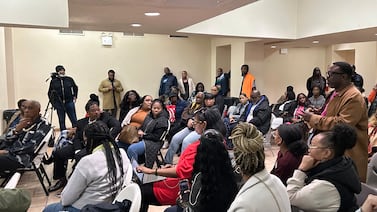Gen Z believes education after high school is necessary. They’re just not so sure about going to a four-year university.
It isn’t that the generation born between 1997 and 2012 doesn’t want to get a bachelor’s degree, according to a recent study by the ECMC Group. The cost of tuition, student debt, and not feeling prepared keep them from heading to a university. Some are more open to certificate programs, apprenticeships, two-year degrees, and on-the-job training as viable paths to a career.
The general attitudes of Gen Z students, documented in the report by the group that pushes to help students succeed, tracks similarly to what Colorado college counseling groups hear. Advisors say students they talk to are recovering from an unprecedented pandemic and they’re more cost conscious about their education. Gen Z students are putting financial security first.
“They’ve seen so many people just operate to survive during the pandemic,” said Melissa Muniz, the Latin American Educational Foundation student services and program manager.
With those attitudes in mind, counselors say there’s a balance in helping Gen Z students understand how to approach their education. About 65% of students say post-high school education is important, the report says. And almost 60% say they can be successful without a four-year degree.
Having a four-year degree has benefits. State data shows having a bachelor’s degree can open opportunities for more secure and higher-paying jobs that Gen Z students seek. Residents with a bachelor’s degree are also more mobile.
Nonetheless, financial worries persist about the high cost of tuition at a four-year university or the debt students might be saddled with after they graduate. The study says six in 10 teens worry about how to pay for their education. That can hold them back.
Students do have options in Colorado, and it’s true that some students can get what they want out of their education from a shorter-term program.
But the study shows not enough students feel they get the counseling they need to make the decision. About 63% said they need guidance on finances and 48% said they need education and career guidance.
“They’re operating from this place where they want to find something they love, they want to find something they’re passionate about doing,” said Muniz, whose nonprofit pushes for greater access to higher education among Latino and Hispanic students. “But they question how they are also going to have stability so that they can provide for themselves and for their families.”
Gabriel Guindon, Denver Scholarship Foundation college access director, said counselors always make sure students know about Colorado’s talent pipeline report that says about 92% of the top jobs statewide require schooling beyond a high school diploma. The Denver foundation helps students realize their college dreams through advising and financial aid.
Students also should get advised individually to find the best fit, whether that’s academic, financial, or social, he said. Guindon offers advice on how to pay for a four-year degree, but he doesn’t steer students just toward universities. He tries to help students see that an education beyond college is necessary and at their fingertips.
Gen Z’s openness toward other options expressed in the survey aligns with some of Colorado’s higher education priorities. Colorado’s higher education strategic plan calls for students to get a return on what they pay, help more low-income students get into programs after high school, and for colleges to work more closely with employers.
The state has been investing more in programs that connect post-high school education and industries that need more trained workers. Sometimes these programs lead to a bachelor’s degree and sometimes they don’t.
The state wants more high school students to leave with a certificate or credential that can lead to a job and has free high school programs where students can attend college-level classes and earn credit.
Colorado now offers free college and training in a range of fields where there’s a shortage of workers, such as teaching, firefighting, and law enforcement. These programs can help students find a track that fits their interests and offers good job prospects after completion. These programs expanded on Colorado’s CareForward program, which provides free education for health care fields.
Other examples include schools such as Colorado Mountain College, which partners with local employers to create practical training for students to get jobs on the Western Slope. Community colleges such as the Community College of Aurora have also cut some arts and humanities programs to focus on courses that prepare students for jobs.
Sachs Foundation President Ben Ralston said Gen Z attitudes he’s observed are also reactions to issues that should be challenged. The national survey says students want their interests to lead to fulfillment in their careers.
Ralston, whose nonprofit supports Black Colorado students, said he’s heard from many students who want to learn business or engineering because they care most about the money they’ll earn. Some students, however, have no interest in those careers and won’t find fulfillment, he said.
Adults shouldn’t forget a four-year education also can lead to jobs that may not pay as much, but help create a more robust society through art, literature, or teaching, he said. It’s on state leaders to help make jobs with high societal value worth the time students spend getting educated for them and to help students find value in creativity.
For instance, Ralson said Colorado needs more Black educators. The foundation and Teach for America Colorado have teamed up to provide financial and career development support to Black educators, through learning groups and a salary incentive.
Sachs Foundation Chief Operating Officer Pamela Roberts said Gen Z notions about higher ed also can be challenged simply by offering them information. Not every student has to go to an Ivy League school and most students realize that college is more affordable than they expect depending on where they go.
Muniz said, however, students too often don’t get the information they need to make dreams a reality.
“They know what it takes and they know what they might want to do,” she said. “But some of them are just lacking that confidence or lacking that ability or the resources to really understand how to take advantage of these opportunities.”
Correction: The original story incorrectly named the organization that worked on the study. The ECMC Group conducted the study.
Jason Gonzales is a reporter covering higher education and the Colorado legislature. Chalkbeat Colorado partners with Open Campus on higher education coverage. Contact Jason at jgonzales@chalkbeat.org.






